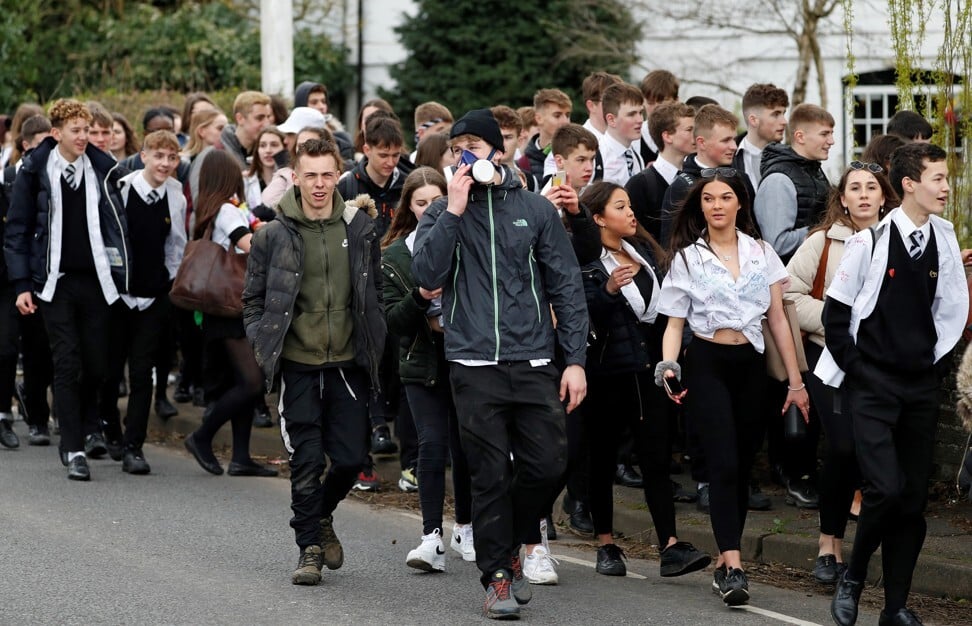
With school exams postponed or cancelled over coronavirus pandemic, students worry about their university prospects
- Universities offer students places based on predicted grades and results obtained in past exams as hard evidence of ability
- Exam boards are developing formulas to calculate grades, but many students are anxious about what this may mean for their future study plans
While some exam boards in Hong Kong and elsewhere have postponed secondary school exams, many students around the world are trying to deal with the unprecedented situation of having their exams cancelled as part of government efforts to slow the spread of Covid-19 infection.
The exam-focused education system has left students feeling adrift. And the cancellations have brought into focus school-based assessment, where teachers are being required to compute a final grade.
Boards are developing a “formula” to calculate grades for each student that will reflect their performance as closely as possible, says the Office of Qualifications and Examinations Regulation (Ofqual), a government department that regulates qualifications, exams and tests in England. And the metrics will be applied consistently across all schools.
“This will include the steps we would like teachers to follow and more detailed guidance on how to consider the full range of evidence they will have available when submitting their assessment grades,” it said.

Such announcements are hardly reassuring for students and parents anxious about the uncertainty surrounding grades, and how they will impact university admissions.
“My daughter was at school in Britain when she heard the news. She and her classmates were genuinely shocked and were all in tears,” one Hong Kong parent says. “No one had anticipated the cancellation, as at that time all schools there were still open. It was believed that, even if schools did close for teaching purposes, they could still function as exam centres with plenty of space for ‘distancing’ tables and implementing other safety measures.”

A concern for students in Hong Kong entering university two years down the line is that university offers are based on predicted International Baccalaureate (IB), A-level or Hong Kong Diploma of Secondary Education (HKDSE) grades. Universities and schools would generally also look at International General Certificate of Secondary Education (IGCSE) results obtained in the past, as hard evidence of student ability when predicting grades for university admissions.
I conducted a small survey. Interestingly, the reactions of students I spoke with could be grouped into one of three categories.

A few students whose work has been consistent throughout their course expressed deep regret in not being able to showcase their knowledge in a rigorous exam setting. One student had set herself personal goals for IGCSE and was working towards them diligently. Her chances of achieving those grades were confirmed as very realistic by all her teachers at her parent-teacher conference.
A majority of students expressed regret at the cancellation of exams because they were not happy with their mock exam results and had planned to improve upon them. They felt they were denied the opportunity for serious revision and could have achieved better grades in the final examination. They are now concerned that the mock exam grade and other evidence will be a poor reflection of their inherent ability and therefore unfair.
A few underperforming students who have shown a certain level of indifference throughout their two-year IGCSE and IB courses are thrilled at this “free pass”. They have managed to avoid sitting an examination they were ill-prepared for. With teachers now allowing them the benefit of what they could have learned in the run-up to the exams, these students may now even pass, or pass with grades better than those they themselves anticipated.

But will they have passed the litmus test of schooling? Developing habits that lead to intellectual independence is one of the greatest by-products of board exams. In the final analysis, there are no free lunches. A high-stakes summative assessment gives students an internal barometer that establishes a correlation between effort and grade.
One parent said insightfully: “On the one hand, it’s certainly not the end of the world. There are far greater personal or world problems. Yet it is difficult to manage a child’s expectations and angst.”
If her daughter does get the grades she had hoped for, and was working towards, it would not give the same sense of achievement as she would have had if she sat those exams and had them marked independently. It may also not have the same credence for universities or employers later, irrespective of what the government says now.
Perhaps the lesson here for students is to prepare well for the unexpected. Such life skills are more important than a grade.
Anjali Hazari is a retired international-school biology educator who has taught for three decades in Hong Kong and has received several accolades in her teaching career. She continues to tutor and write extensively on education policy and practice.

